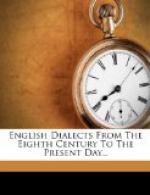W. I zay, Jan! I axed Meyastur about that are last night.
J. Well, what ded ur zay?
W. Why, a zed one neyam ez jest
zo vittun vor’n as tother; and
he lowz a ben caal’d straddlebob
ever zunce the Island was vust
meyad.
J. Well, if that’s the keeas, I spooas I lost the quart.
W. That thee hast, lucky; and we’ll
goo down to Arreton to the
Rid Lion and drink un ater we done work.
Notes.—Observe z for s, and v for f initially. What’s, What hast thou; nammut (lit. noon-meat), luncheon, usually eaten at 9 A.M. (n{-o}na h{-o}ra); leyarn, learn; esn, is not; gurt, great; zote, soft, silly; casn’t, canst not; laay, lay, wager; how’t wool, how it will; that are, that there; lowz (lit. allows), opines; zunce, since; vust meyad, first made; keeas, case; lucky, look ye!
SOUTHERN (Group 7): EAST SUSSEX.
The following quotations are from the Dictionary of the Sussex Dialect, by the Rev. W.D. Parish, Vicar of Selmeston; E.D.S. 1875. The Glossary refers rather to E. than to W. Sussex, Selmeston being between Lewes and Eastbourne.
Call over, to abuse. “He
come along here a-cadging, and fancy he
just did call me over, because I told
him as I hadn’t got naun to
give him.” (Naun, nothing.)
Clocksmith, a watchmaker. “I be quite lost about time, I be; for I’ve been forced to send my watch to the clocksmith. I couldn’t make no sense of mending it myself; for I’d iled it and I’d biled it, and then I couldn’t do more with it.”
Cocker-up, to spoil; to gloss over with an air of truth. “You see this here chap of hers, he’s cockered-up some story about having to goo away somewheres up into the sheeres; and I tell her she’s no call to be so cluck over it; and for my part I dunno but what I be very glad an’t, for he was a chap as was always a-cokeing about the cupboards, and cogging her out of a Sunday.” (The sheeres, any shire of England except Kent and Sussex; call, reason; cluck, out of spirits; coke, to peep; cog, to entice.)
Joy, a jay. “Poor old Master Crockham, he’s in terrible order, surel{’y}! The meece have taken his peas, and the joys have got at his beans, and the snags have spilt all his lettuce.” (Order, bad temper; meece, mice; snags, snails; spilt, spoilt.)
Kiddle, to tickle. “Those
thunder-bugs did kiddle me so that I
couldn’t keep still no hows.”
(Thunder-bug, a midge.)
Lawyer, a long bramble full of
thorns, so called because, “when
once they gets a holt an ye, ye do{a}nt
easy get shut of ’em.”




